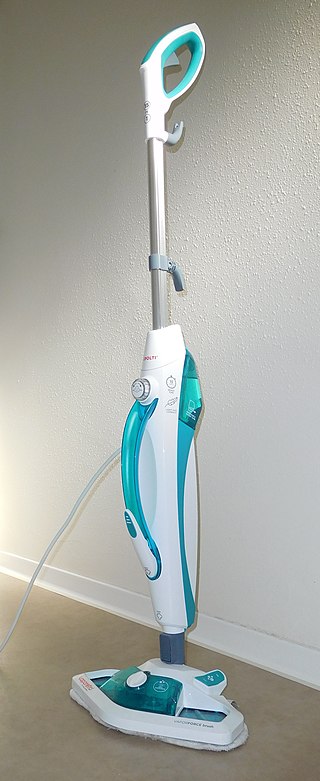
A vacuum cleaner, also known simply as a vacuum, is a device that uses suction, and often agitation, in order to remove dirt and other debris from carpets and hard floors.

Roomba is a term that refers to a series of autonomous robotic vacuum cleaners made by the company iRobot, and was first introduced in September 2002. Roombas have a set of sensors which help them navigate the floor area of a home. These sensors can detect the presence of obstacles and steep drops.

iRobot Corporation is an American technology company that designs and builds consumer robots. It was founded in 1990 by three members of MIT's Artificial Intelligence Lab, who designed robots for space exploration and military defense. The company's products include a range of autonomous home vacuum cleaners (Roomba), floor moppers, and other autonomous cleaning devices.

A mop is a mass or bundle of coarse strings or yarn, etc., or a piece of cloth, sponge or other absorbent material, attached to a pole or stick. It is used to soak up liquid, for cleaning floors and other surfaces, to mop up dust, or for other cleaning purposes.
Housekeeping is the management and routine support activities of running and maintaining an organized physical institution occupied or used by people, like a house, ship, hospital or factory, such as cleaning, tidying/organizing, cooking, shopping, and bill payment. These tasks may be performed by members of the household, or by persons hired for the purpose. This is a more broad role than a cleaner, who is focused only on the cleaning aspect. The term is also used to refer to the money allocated for such use. By extension, it may also refer to an office or a corporation, as well as the maintenance of computer storage systems.

Swiffer is an American brand of cleaning products that is made by Procter & Gamble. Introduced in 1999, the brand uses the "razor-and-blades" business model, whereby the consumer purchases the handle assembly at a low price, but must continue to purchase replacement refills and pads over the lifespan of the product. Swiffer has become a half-billion dollar brand in fifteen countries.
Vanish is an American brand of toilet bowl cleaner produced by S. C. Johnson in North America. They obtained the brand through the purchase of The Drackett Company in 1992.

Carpet cleaning is performed to remove stains, dirt, debris, and allergens from carpets. Common methods include hot water extraction, dry-cleaning, and vacuuming.

Vapor steam cleaners or steam vapor systems are cleaning appliances or devices that use steam to dry, clean, and sanitize surfaces. The steam is produced in a boiler that heats tap water to high temperatures to produce low-pressure, low moisture water vapor.

Floor cleaning is a major occupation throughout the world. The main job of most cleaners is to clean floors.
Domestic robots can vary widely in their capabilities and tasks. Sensors include: cliff or stair sensors, motion sensors, ultrasonic object sensors, dirt sensors, IR sensors, and more. Intelligence varies also. Some have none while others can map out their environment and maneuver using complex algorithms.

Evolution Robotics was an American technological company based in Pasadena, California. It specialized in robotics technologies, with computer vision, localization, and autonomous navigation products.
A truckmount carpet cleaner is a carpet and upholstery cleaning unit that is generally mounted to the floor of a van or trailer. Its cleaning method is hot water extraction. The operator would park the van near the premises, connect the vacuum hose and solution line hose into the machine, bring the hoses into the building, and connect a carpet cleaning wand to the end of the hoses.

A robotic vacuum cleaner, sometimes called a robovac or a roomba as a generic trademark, is an autonomous robotic vacuum cleaner which has a limited vacuum floor cleaning system combined with sensors and robotic drives with programmable controllers and cleaning routines. Early designs included manual operation via remote control and a "self-drive" mode which allowed the machine to clean autonomously.

A domestic robot or homebot is a type of service robot, an autonomous robot that is primarily used for household chores, but may also be used for education, entertainment or therapy. While most domestic robots are simplistic, some are connected to Wi-Fi home networks or smart environments and are autonomous to a high degree. There were an estimated 16.3 million service robots in 2018.

A floor scrubber is a floor cleaning device. It can be a simple tool such as a floor mop or floor brush, or in the form of a walk-behind or a ride-on machine to clean larger areas by injecting water with cleaning solution, scrubbing, and lifting the residue off the floor. With advancements in robotics, autonomous floor-scrubbing robots are available as well.
Ecovacs Robotics is a Chinese technology company. It is best known for developing in-home robotic appliances. The company was founded in 1998 by Qian Dongqi and is headquartered in Suzhou, China. According to Global Asia, Ecovacs Robotics had more than 60% of the Chinese market for robots by 2013. In 2023, Nikkei Asia had reported that the market capitalisation of Ecovacs Robotics has grown to near $6.38 billion, which is "roughly 5 times" that of the market capitalisation of rivalling US based iRobot, who manufactures the Roomba.
Xiaomi Smart Home Products are products released by third-party manufacturers who have partnered with Xiaomi. These products are managed by Xiaomi Home app.
Roborock is a Chinese consumer goods company known for its robotic sweeping and mopping devices and handheld cordless stick vacuums. Xiaomi played a key role in the company's founding.













